A Comprehensive Research Report: Computer Ethics and Professionalism
VerifiedAdded on 2023/01/23
|14
|2716
|26
Report
AI Summary
This report provides a comprehensive overview of computer ethics and professionalism, addressing the growing importance of ethical considerations in the field of computer science. It explores various aspects of computer ethics, including information security, privacy, and the impact of technology on society. The report delves into the responsibilities of computer professionals, examining ethical guidelines and the need for moral conduct. It also discusses the evolution of computer ethics, highlighting key research areas and the need for continuous development in this domain. The methodology involves a literature review, analyzing philosophical perspectives and the views of experts. The research question focuses on who should teach computer ethics and why. The report emphasizes the role of computer ethics in shaping the future of technology and the need for a strong understanding of moral principles in the field.
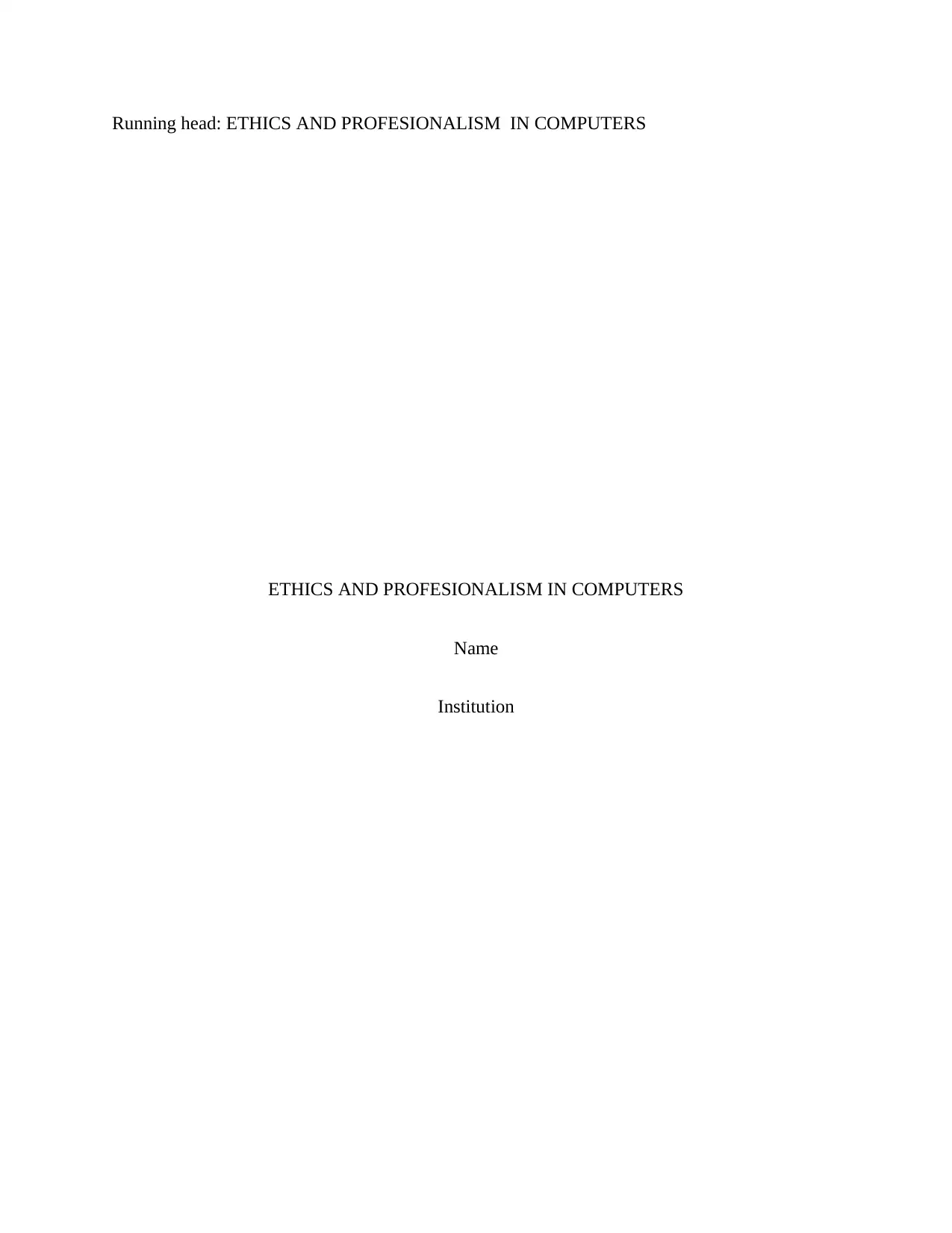
Running head: ETHICS AND PROFESIONALISM IN COMPUTERS
ETHICS AND PROFESIONALISM IN COMPUTERS
Name
Institution
ETHICS AND PROFESIONALISM IN COMPUTERS
Name
Institution
Paraphrase This Document
Need a fresh take? Get an instant paraphrase of this document with our AI Paraphraser
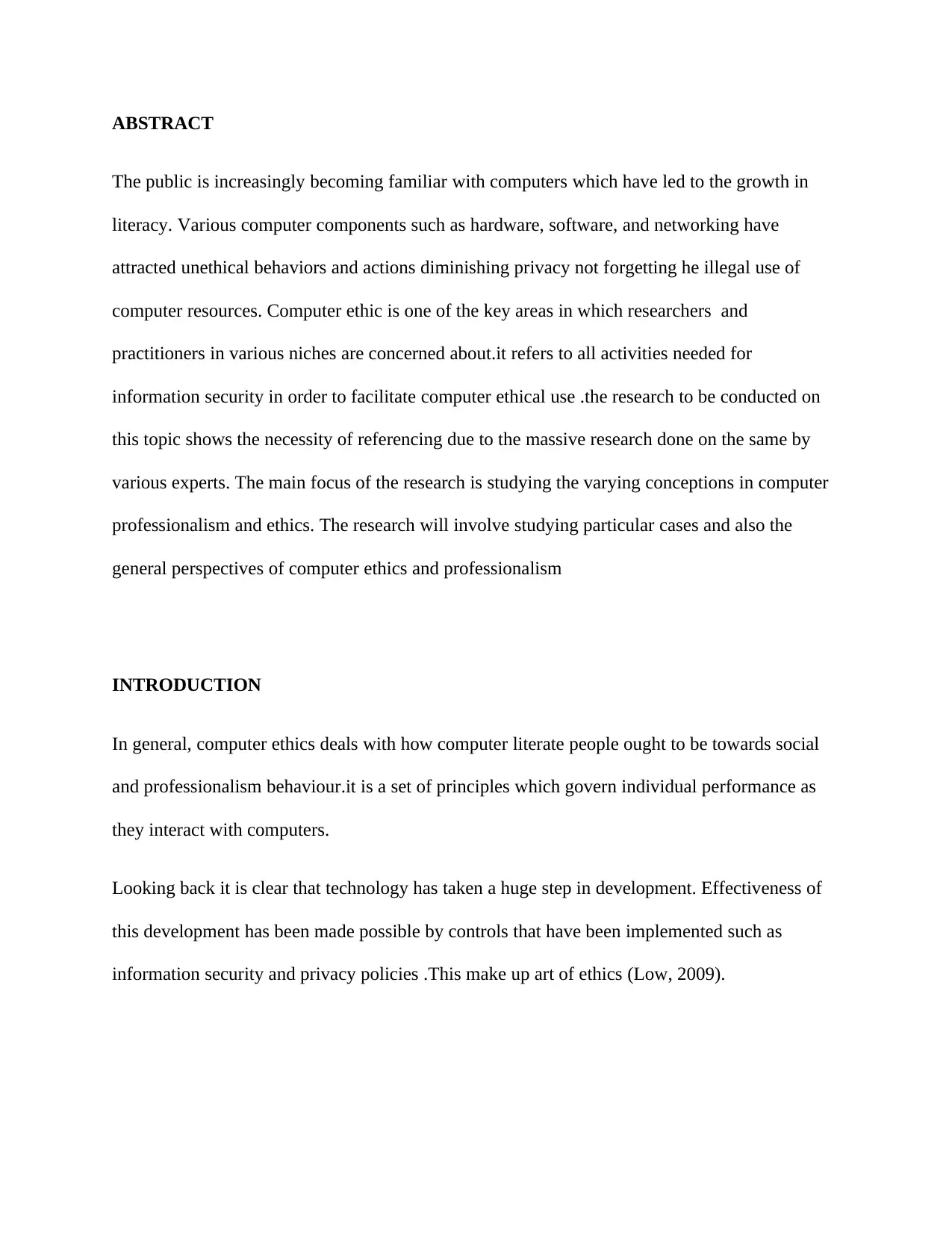
ABSTRACT
The public is increasingly becoming familiar with computers which have led to the growth in
literacy. Various computer components such as hardware, software, and networking have
attracted unethical behaviors and actions diminishing privacy not forgetting he illegal use of
computer resources. Computer ethic is one of the key areas in which researchers and
practitioners in various niches are concerned about.it refers to all activities needed for
information security in order to facilitate computer ethical use .the research to be conducted on
this topic shows the necessity of referencing due to the massive research done on the same by
various experts. The main focus of the research is studying the varying conceptions in computer
professionalism and ethics. The research will involve studying particular cases and also the
general perspectives of computer ethics and professionalism
INTRODUCTION
In general, computer ethics deals with how computer literate people ought to be towards social
and professionalism behaviour.it is a set of principles which govern individual performance as
they interact with computers.
Looking back it is clear that technology has taken a huge step in development. Effectiveness of
this development has been made possible by controls that have been implemented such as
information security and privacy policies .This make up art of ethics (Low, 2009).
The public is increasingly becoming familiar with computers which have led to the growth in
literacy. Various computer components such as hardware, software, and networking have
attracted unethical behaviors and actions diminishing privacy not forgetting he illegal use of
computer resources. Computer ethic is one of the key areas in which researchers and
practitioners in various niches are concerned about.it refers to all activities needed for
information security in order to facilitate computer ethical use .the research to be conducted on
this topic shows the necessity of referencing due to the massive research done on the same by
various experts. The main focus of the research is studying the varying conceptions in computer
professionalism and ethics. The research will involve studying particular cases and also the
general perspectives of computer ethics and professionalism
INTRODUCTION
In general, computer ethics deals with how computer literate people ought to be towards social
and professionalism behaviour.it is a set of principles which govern individual performance as
they interact with computers.
Looking back it is clear that technology has taken a huge step in development. Effectiveness of
this development has been made possible by controls that have been implemented such as
information security and privacy policies .This make up art of ethics (Low, 2009).
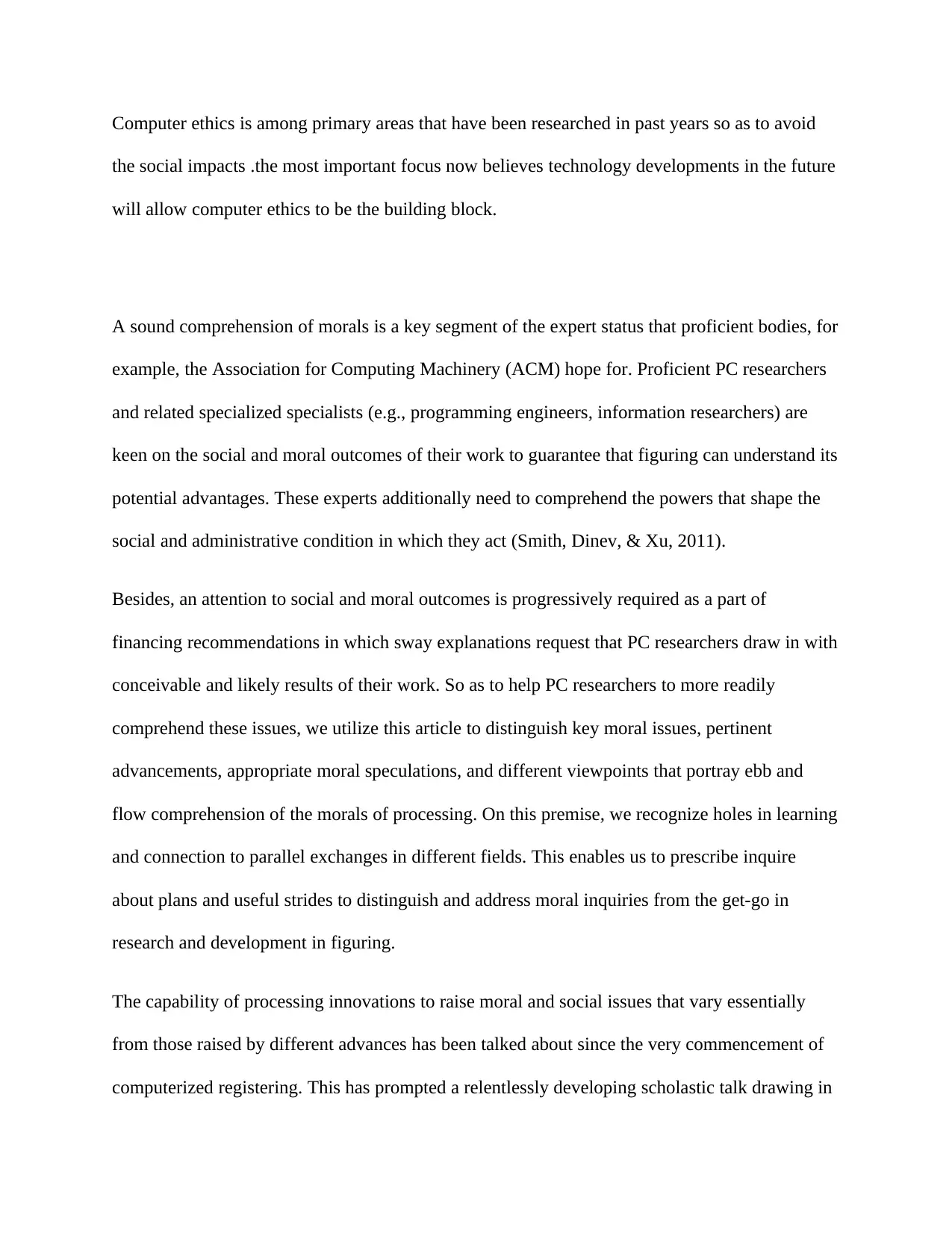
Computer ethics is among primary areas that have been researched in past years so as to avoid
the social impacts .the most important focus now believes technology developments in the future
will allow computer ethics to be the building block.
A sound comprehension of morals is a key segment of the expert status that proficient bodies, for
example, the Association for Computing Machinery (ACM) hope for. Proficient PC researchers
and related specialized specialists (e.g., programming engineers, information researchers) are
keen on the social and moral outcomes of their work to guarantee that figuring can understand its
potential advantages. These experts additionally need to comprehend the powers that shape the
social and administrative condition in which they act (Smith, Dinev, & Xu, 2011).
Besides, an attention to social and moral outcomes is progressively required as a part of
financing recommendations in which sway explanations request that PC researchers draw in with
conceivable and likely results of their work. So as to help PC researchers to more readily
comprehend these issues, we utilize this article to distinguish key moral issues, pertinent
advancements, appropriate moral speculations, and different viewpoints that portray ebb and
flow comprehension of the morals of processing. On this premise, we recognize holes in learning
and connection to parallel exchanges in different fields. This enables us to prescribe inquire
about plans and useful strides to distinguish and address moral inquiries from the get-go in
research and development in figuring.
The capability of processing innovations to raise moral and social issues that vary essentially
from those raised by different advances has been talked about since the very commencement of
computerized registering. This has prompted a relentlessly developing scholastic talk drawing in
the social impacts .the most important focus now believes technology developments in the future
will allow computer ethics to be the building block.
A sound comprehension of morals is a key segment of the expert status that proficient bodies, for
example, the Association for Computing Machinery (ACM) hope for. Proficient PC researchers
and related specialized specialists (e.g., programming engineers, information researchers) are
keen on the social and moral outcomes of their work to guarantee that figuring can understand its
potential advantages. These experts additionally need to comprehend the powers that shape the
social and administrative condition in which they act (Smith, Dinev, & Xu, 2011).
Besides, an attention to social and moral outcomes is progressively required as a part of
financing recommendations in which sway explanations request that PC researchers draw in with
conceivable and likely results of their work. So as to help PC researchers to more readily
comprehend these issues, we utilize this article to distinguish key moral issues, pertinent
advancements, appropriate moral speculations, and different viewpoints that portray ebb and
flow comprehension of the morals of processing. On this premise, we recognize holes in learning
and connection to parallel exchanges in different fields. This enables us to prescribe inquire
about plans and useful strides to distinguish and address moral inquiries from the get-go in
research and development in figuring.
The capability of processing innovations to raise moral and social issues that vary essentially
from those raised by different advances has been talked about since the very commencement of
computerized registering. This has prompted a relentlessly developing scholastic talk drawing in
⊘ This is a preview!⊘
Do you want full access?
Subscribe today to unlock all pages.

Trusted by 1+ million students worldwide
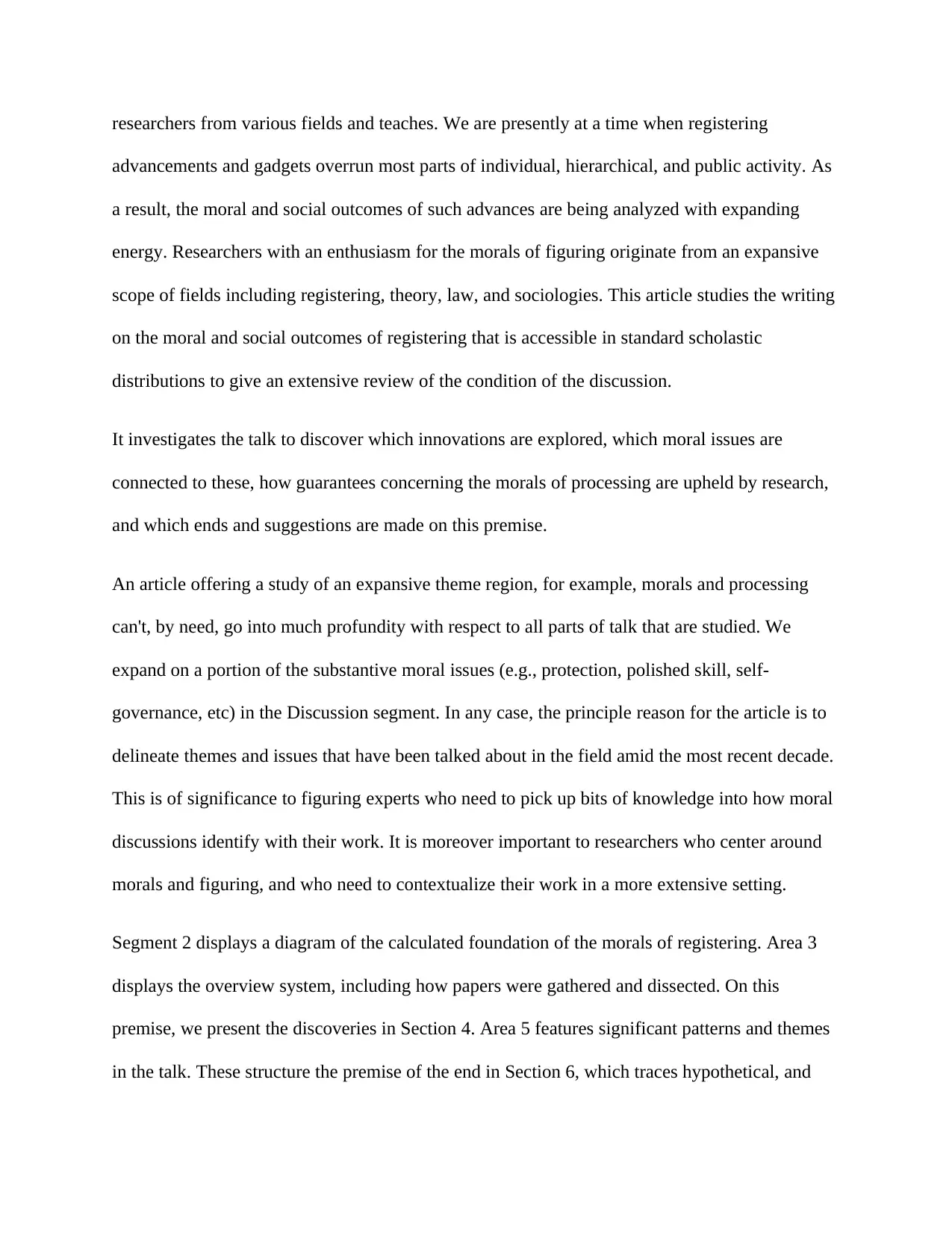
researchers from various fields and teaches. We are presently at a time when registering
advancements and gadgets overrun most parts of individual, hierarchical, and public activity. As
a result, the moral and social outcomes of such advances are being analyzed with expanding
energy. Researchers with an enthusiasm for the morals of figuring originate from an expansive
scope of fields including registering, theory, law, and sociologies. This article studies the writing
on the moral and social outcomes of registering that is accessible in standard scholastic
distributions to give an extensive review of the condition of the discussion.
It investigates the talk to discover which innovations are explored, which moral issues are
connected to these, how guarantees concerning the morals of processing are upheld by research,
and which ends and suggestions are made on this premise.
An article offering a study of an expansive theme region, for example, morals and processing
can't, by need, go into much profundity with respect to all parts of talk that are studied. We
expand on a portion of the substantive moral issues (e.g., protection, polished skill, self-
governance, etc) in the Discussion segment. In any case, the principle reason for the article is to
delineate themes and issues that have been talked about in the field amid the most recent decade.
This is of significance to figuring experts who need to pick up bits of knowledge into how moral
discussions identify with their work. It is moreover important to researchers who center around
morals and figuring, and who need to contextualize their work in a more extensive setting.
Segment 2 displays a diagram of the calculated foundation of the morals of registering. Area 3
displays the overview system, including how papers were gathered and dissected. On this
premise, we present the discoveries in Section 4. Area 5 features significant patterns and themes
in the talk. These structure the premise of the end in Section 6, which traces hypothetical, and
advancements and gadgets overrun most parts of individual, hierarchical, and public activity. As
a result, the moral and social outcomes of such advances are being analyzed with expanding
energy. Researchers with an enthusiasm for the morals of figuring originate from an expansive
scope of fields including registering, theory, law, and sociologies. This article studies the writing
on the moral and social outcomes of registering that is accessible in standard scholastic
distributions to give an extensive review of the condition of the discussion.
It investigates the talk to discover which innovations are explored, which moral issues are
connected to these, how guarantees concerning the morals of processing are upheld by research,
and which ends and suggestions are made on this premise.
An article offering a study of an expansive theme region, for example, morals and processing
can't, by need, go into much profundity with respect to all parts of talk that are studied. We
expand on a portion of the substantive moral issues (e.g., protection, polished skill, self-
governance, etc) in the Discussion segment. In any case, the principle reason for the article is to
delineate themes and issues that have been talked about in the field amid the most recent decade.
This is of significance to figuring experts who need to pick up bits of knowledge into how moral
discussions identify with their work. It is moreover important to researchers who center around
morals and figuring, and who need to contextualize their work in a more extensive setting.
Segment 2 displays a diagram of the calculated foundation of the morals of registering. Area 3
displays the overview system, including how papers were gathered and dissected. On this
premise, we present the discoveries in Section 4. Area 5 features significant patterns and themes
in the talk. These structure the premise of the end in Section 6, which traces hypothetical, and
Paraphrase This Document
Need a fresh take? Get an instant paraphrase of this document with our AI Paraphraser
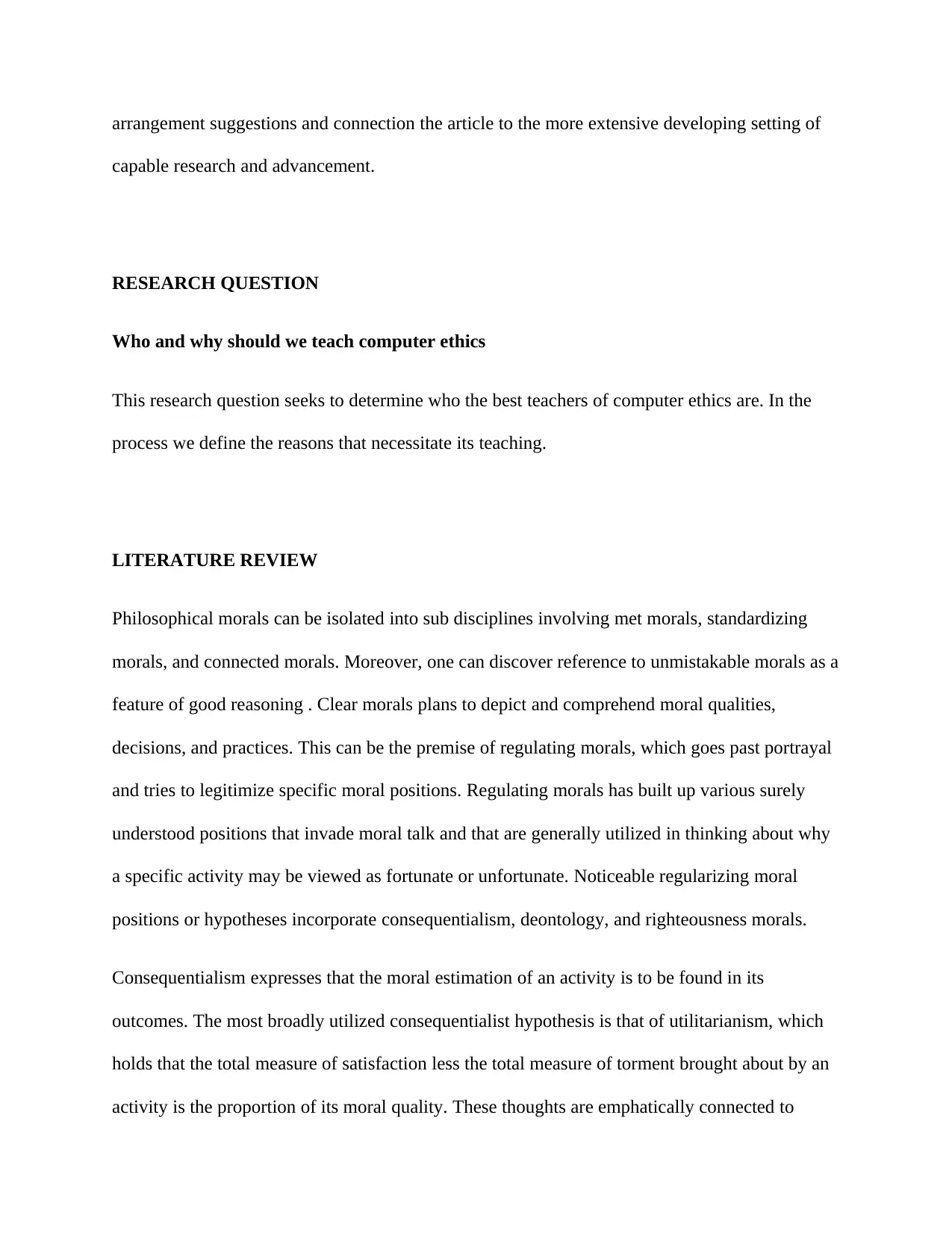
arrangement suggestions and connection the article to the more extensive developing setting of
capable research and advancement.
RESEARCH QUESTION
Who and why should we teach computer ethics
This research question seeks to determine who the best teachers of computer ethics are. In the
process we define the reasons that necessitate its teaching.
LITERATURE REVIEW
Philosophical morals can be isolated into sub disciplines involving met morals, standardizing
morals, and connected morals. Moreover, one can discover reference to unmistakable morals as a
feature of good reasoning . Clear morals plans to depict and comprehend moral qualities,
decisions, and practices. This can be the premise of regulating morals, which goes past portrayal
and tries to legitimize specific moral positions. Regulating morals has built up various surely
understood positions that invade moral talk and that are generally utilized in thinking about why
a specific activity may be viewed as fortunate or unfortunate. Noticeable regularizing moral
positions or hypotheses incorporate consequentialism, deontology, and righteousness morals.
Consequentialism expresses that the moral estimation of an activity is to be found in its
outcomes. The most broadly utilized consequentialist hypothesis is that of utilitarianism, which
holds that the total measure of satisfaction less the total measure of torment brought about by an
activity is the proportion of its moral quality. These thoughts are emphatically connected to
capable research and advancement.
RESEARCH QUESTION
Who and why should we teach computer ethics
This research question seeks to determine who the best teachers of computer ethics are. In the
process we define the reasons that necessitate its teaching.
LITERATURE REVIEW
Philosophical morals can be isolated into sub disciplines involving met morals, standardizing
morals, and connected morals. Moreover, one can discover reference to unmistakable morals as a
feature of good reasoning . Clear morals plans to depict and comprehend moral qualities,
decisions, and practices. This can be the premise of regulating morals, which goes past portrayal
and tries to legitimize specific moral positions. Regulating morals has built up various surely
understood positions that invade moral talk and that are generally utilized in thinking about why
a specific activity may be viewed as fortunate or unfortunate. Noticeable regularizing moral
positions or hypotheses incorporate consequentialism, deontology, and righteousness morals.
Consequentialism expresses that the moral estimation of an activity is to be found in its
outcomes. The most broadly utilized consequentialist hypothesis is that of utilitarianism, which
holds that the total measure of satisfaction less the total measure of torment brought about by an
activity is the proportion of its moral quality. These thoughts are emphatically connected to
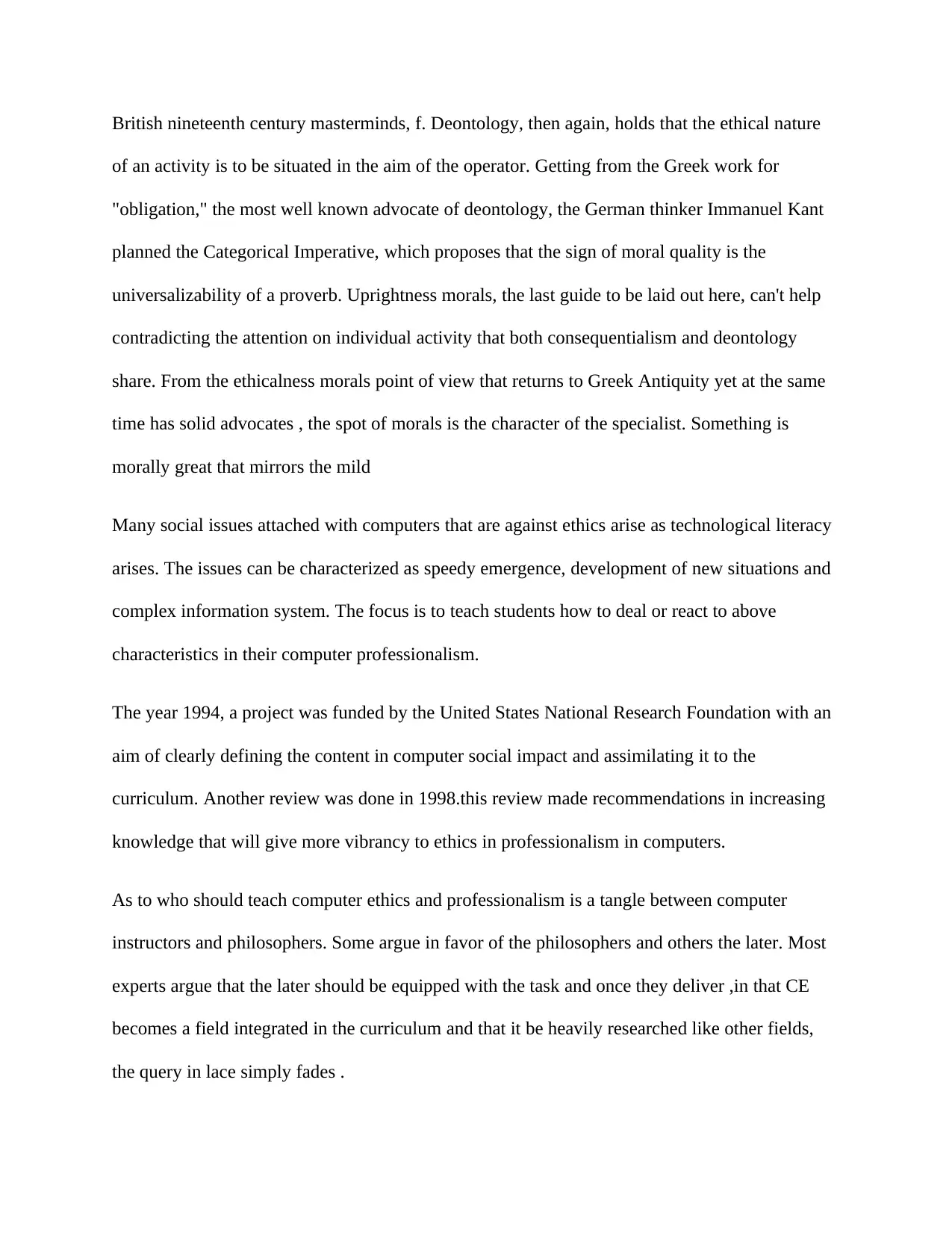
British nineteenth century masterminds, f. Deontology, then again, holds that the ethical nature
of an activity is to be situated in the aim of the operator. Getting from the Greek work for
"obligation," the most well known advocate of deontology, the German thinker Immanuel Kant
planned the Categorical Imperative, which proposes that the sign of moral quality is the
universalizability of a proverb. Uprightness morals, the last guide to be laid out here, can't help
contradicting the attention on individual activity that both consequentialism and deontology
share. From the ethicalness morals point of view that returns to Greek Antiquity yet at the same
time has solid advocates , the spot of morals is the character of the specialist. Something is
morally great that mirrors the mild
Many social issues attached with computers that are against ethics arise as technological literacy
arises. The issues can be characterized as speedy emergence, development of new situations and
complex information system. The focus is to teach students how to deal or react to above
characteristics in their computer professionalism.
The year 1994, a project was funded by the United States National Research Foundation with an
aim of clearly defining the content in computer social impact and assimilating it to the
curriculum. Another review was done in 1998.this review made recommendations in increasing
knowledge that will give more vibrancy to ethics in professionalism in computers.
As to who should teach computer ethics and professionalism is a tangle between computer
instructors and philosophers. Some argue in favor of the philosophers and others the later. Most
experts argue that the later should be equipped with the task and once they deliver ,in that CE
becomes a field integrated in the curriculum and that it be heavily researched like other fields,
the query in lace simply fades .
of an activity is to be situated in the aim of the operator. Getting from the Greek work for
"obligation," the most well known advocate of deontology, the German thinker Immanuel Kant
planned the Categorical Imperative, which proposes that the sign of moral quality is the
universalizability of a proverb. Uprightness morals, the last guide to be laid out here, can't help
contradicting the attention on individual activity that both consequentialism and deontology
share. From the ethicalness morals point of view that returns to Greek Antiquity yet at the same
time has solid advocates , the spot of morals is the character of the specialist. Something is
morally great that mirrors the mild
Many social issues attached with computers that are against ethics arise as technological literacy
arises. The issues can be characterized as speedy emergence, development of new situations and
complex information system. The focus is to teach students how to deal or react to above
characteristics in their computer professionalism.
The year 1994, a project was funded by the United States National Research Foundation with an
aim of clearly defining the content in computer social impact and assimilating it to the
curriculum. Another review was done in 1998.this review made recommendations in increasing
knowledge that will give more vibrancy to ethics in professionalism in computers.
As to who should teach computer ethics and professionalism is a tangle between computer
instructors and philosophers. Some argue in favor of the philosophers and others the later. Most
experts argue that the later should be equipped with the task and once they deliver ,in that CE
becomes a field integrated in the curriculum and that it be heavily researched like other fields,
the query in lace simply fades .
⊘ This is a preview!⊘
Do you want full access?
Subscribe today to unlock all pages.

Trusted by 1+ million students worldwide
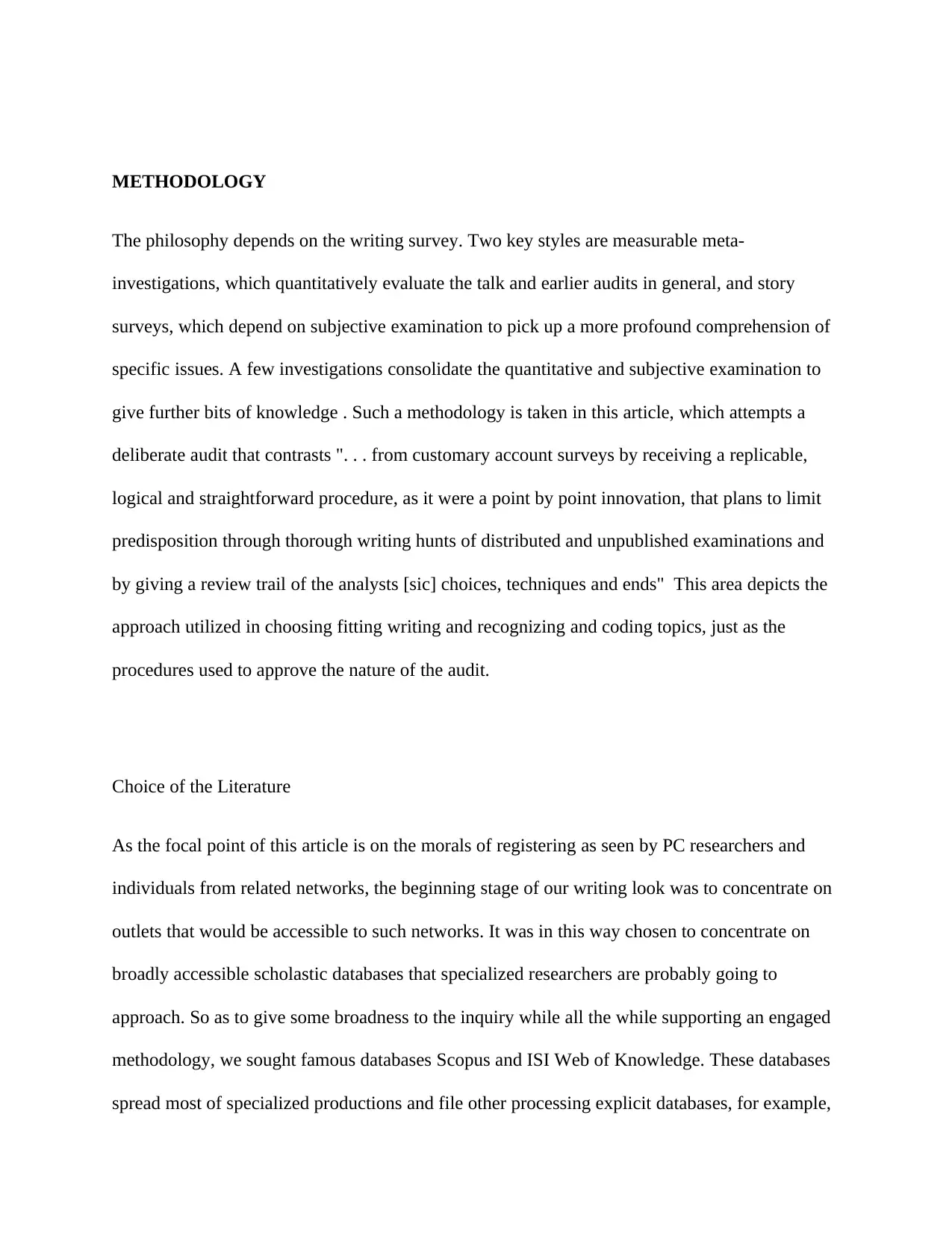
METHODOLOGY
The philosophy depends on the writing survey. Two key styles are measurable meta-
investigations, which quantitatively evaluate the talk and earlier audits in general, and story
surveys, which depend on subjective examination to pick up a more profound comprehension of
specific issues. A few investigations consolidate the quantitative and subjective examination to
give further bits of knowledge . Such a methodology is taken in this article, which attempts a
deliberate audit that contrasts ". . . from customary account surveys by receiving a replicable,
logical and straightforward procedure, as it were a point by point innovation, that plans to limit
predisposition through thorough writing hunts of distributed and unpublished examinations and
by giving a review trail of the analysts [sic] choices, techniques and ends" This area depicts the
approach utilized in choosing fitting writing and recognizing and coding topics, just as the
procedures used to approve the nature of the audit.
Choice of the Literature
As the focal point of this article is on the morals of registering as seen by PC researchers and
individuals from related networks, the beginning stage of our writing look was to concentrate on
outlets that would be accessible to such networks. It was in this way chosen to concentrate on
broadly accessible scholastic databases that specialized researchers are probably going to
approach. So as to give some broadness to the inquiry while all the while supporting an engaged
methodology, we sought famous databases Scopus and ISI Web of Knowledge. These databases
spread most of specialized productions and file other processing explicit databases, for example,
The philosophy depends on the writing survey. Two key styles are measurable meta-
investigations, which quantitatively evaluate the talk and earlier audits in general, and story
surveys, which depend on subjective examination to pick up a more profound comprehension of
specific issues. A few investigations consolidate the quantitative and subjective examination to
give further bits of knowledge . Such a methodology is taken in this article, which attempts a
deliberate audit that contrasts ". . . from customary account surveys by receiving a replicable,
logical and straightforward procedure, as it were a point by point innovation, that plans to limit
predisposition through thorough writing hunts of distributed and unpublished examinations and
by giving a review trail of the analysts [sic] choices, techniques and ends" This area depicts the
approach utilized in choosing fitting writing and recognizing and coding topics, just as the
procedures used to approve the nature of the audit.
Choice of the Literature
As the focal point of this article is on the morals of registering as seen by PC researchers and
individuals from related networks, the beginning stage of our writing look was to concentrate on
outlets that would be accessible to such networks. It was in this way chosen to concentrate on
broadly accessible scholastic databases that specialized researchers are probably going to
approach. So as to give some broadness to the inquiry while all the while supporting an engaged
methodology, we sought famous databases Scopus and ISI Web of Knowledge. These databases
spread most of specialized productions and file other processing explicit databases, for example,
Paraphrase This Document
Need a fresh take? Get an instant paraphrase of this document with our AI Paraphraser
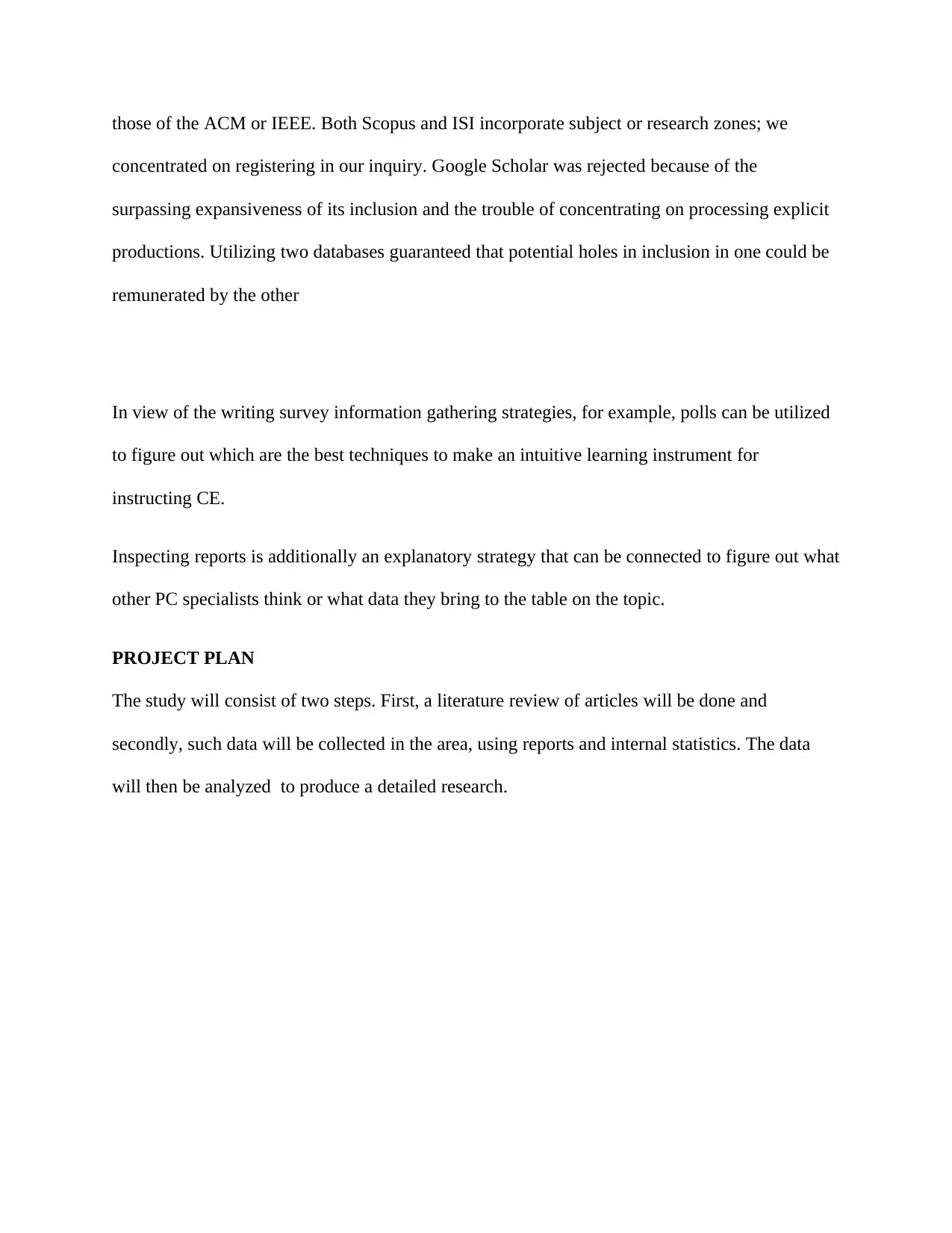
those of the ACM or IEEE. Both Scopus and ISI incorporate subject or research zones; we
concentrated on registering in our inquiry. Google Scholar was rejected because of the
surpassing expansiveness of its inclusion and the trouble of concentrating on processing explicit
productions. Utilizing two databases guaranteed that potential holes in inclusion in one could be
remunerated by the other
In view of the writing survey information gathering strategies, for example, polls can be utilized
to figure out which are the best techniques to make an intuitive learning instrument for
instructing CE.
Inspecting reports is additionally an explanatory strategy that can be connected to figure out what
other PC specialists think or what data they bring to the table on the topic.
PROJECT PLAN
The study will consist of two steps. First, a literature review of articles will be done and
secondly, such data will be collected in the area, using reports and internal statistics. The data
will then be analyzed to produce a detailed research.
concentrated on registering in our inquiry. Google Scholar was rejected because of the
surpassing expansiveness of its inclusion and the trouble of concentrating on processing explicit
productions. Utilizing two databases guaranteed that potential holes in inclusion in one could be
remunerated by the other
In view of the writing survey information gathering strategies, for example, polls can be utilized
to figure out which are the best techniques to make an intuitive learning instrument for
instructing CE.
Inspecting reports is additionally an explanatory strategy that can be connected to figure out what
other PC specialists think or what data they bring to the table on the topic.
PROJECT PLAN
The study will consist of two steps. First, a literature review of articles will be done and
secondly, such data will be collected in the area, using reports and internal statistics. The data
will then be analyzed to produce a detailed research.
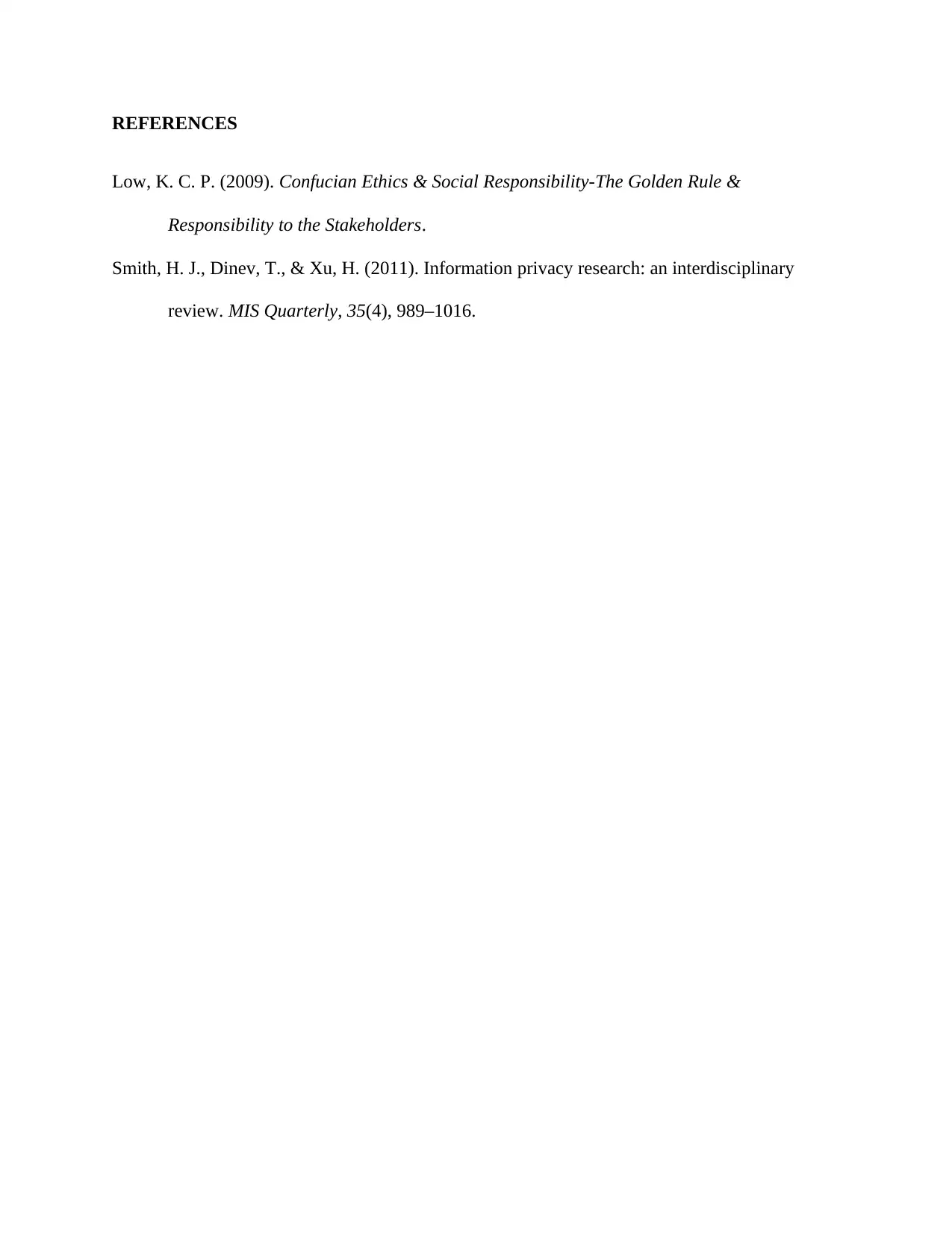
REFERENCES
Low, K. C. P. (2009). Confucian Ethics & Social Responsibility-The Golden Rule &
Responsibility to the Stakeholders.
Smith, H. J., Dinev, T., & Xu, H. (2011). Information privacy research: an interdisciplinary
review. MIS Quarterly, 35(4), 989–1016.
Low, K. C. P. (2009). Confucian Ethics & Social Responsibility-The Golden Rule &
Responsibility to the Stakeholders.
Smith, H. J., Dinev, T., & Xu, H. (2011). Information privacy research: an interdisciplinary
review. MIS Quarterly, 35(4), 989–1016.
⊘ This is a preview!⊘
Do you want full access?
Subscribe today to unlock all pages.

Trusted by 1+ million students worldwide
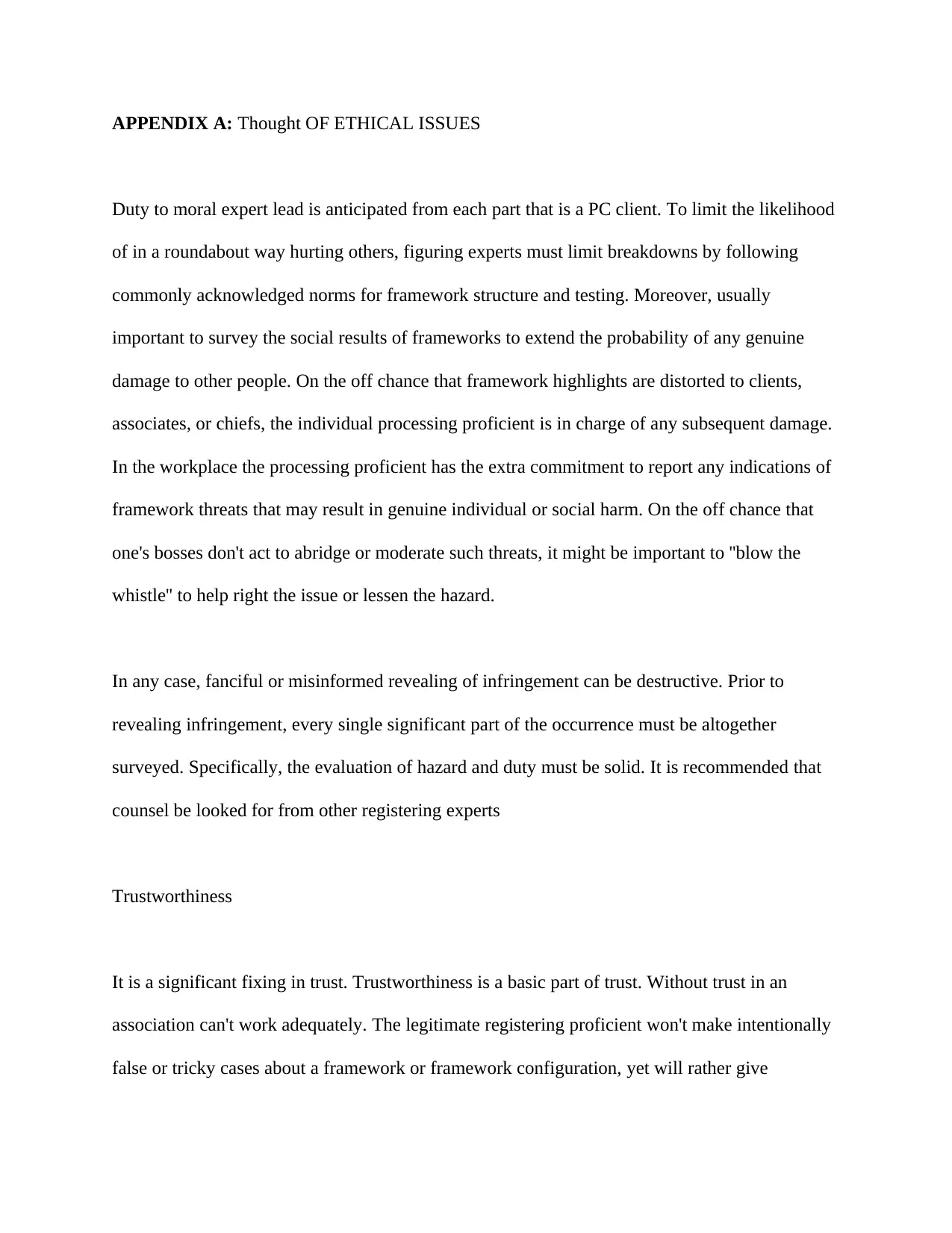
APPENDIX A: Thought OF ETHICAL ISSUES
Duty to moral expert lead is anticipated from each part that is a PC client. To limit the likelihood
of in a roundabout way hurting others, figuring experts must limit breakdowns by following
commonly acknowledged norms for framework structure and testing. Moreover, usually
important to survey the social results of frameworks to extend the probability of any genuine
damage to other people. On the off chance that framework highlights are distorted to clients,
associates, or chiefs, the individual processing proficient is in charge of any subsequent damage.
In the workplace the processing proficient has the extra commitment to report any indications of
framework threats that may result in genuine individual or social harm. On the off chance that
one's bosses don't act to abridge or moderate such threats, it might be important to ''blow the
whistle'' to help right the issue or lessen the hazard.
In any case, fanciful or misinformed revealing of infringement can be destructive. Prior to
revealing infringement, every single significant part of the occurrence must be altogether
surveyed. Specifically, the evaluation of hazard and duty must be solid. It is recommended that
counsel be looked for from other registering experts
Trustworthiness
It is a significant fixing in trust. Trustworthiness is a basic part of trust. Without trust in an
association can't work adequately. The legitimate registering proficient won't make intentionally
false or tricky cases about a framework or framework configuration, yet will rather give
Duty to moral expert lead is anticipated from each part that is a PC client. To limit the likelihood
of in a roundabout way hurting others, figuring experts must limit breakdowns by following
commonly acknowledged norms for framework structure and testing. Moreover, usually
important to survey the social results of frameworks to extend the probability of any genuine
damage to other people. On the off chance that framework highlights are distorted to clients,
associates, or chiefs, the individual processing proficient is in charge of any subsequent damage.
In the workplace the processing proficient has the extra commitment to report any indications of
framework threats that may result in genuine individual or social harm. On the off chance that
one's bosses don't act to abridge or moderate such threats, it might be important to ''blow the
whistle'' to help right the issue or lessen the hazard.
In any case, fanciful or misinformed revealing of infringement can be destructive. Prior to
revealing infringement, every single significant part of the occurrence must be altogether
surveyed. Specifically, the evaluation of hazard and duty must be solid. It is recommended that
counsel be looked for from other registering experts
Trustworthiness
It is a significant fixing in trust. Trustworthiness is a basic part of trust. Without trust in an
association can't work adequately. The legitimate registering proficient won't make intentionally
false or tricky cases about a framework or framework configuration, yet will rather give
Paraphrase This Document
Need a fresh take? Get an instant paraphrase of this document with our AI Paraphraser
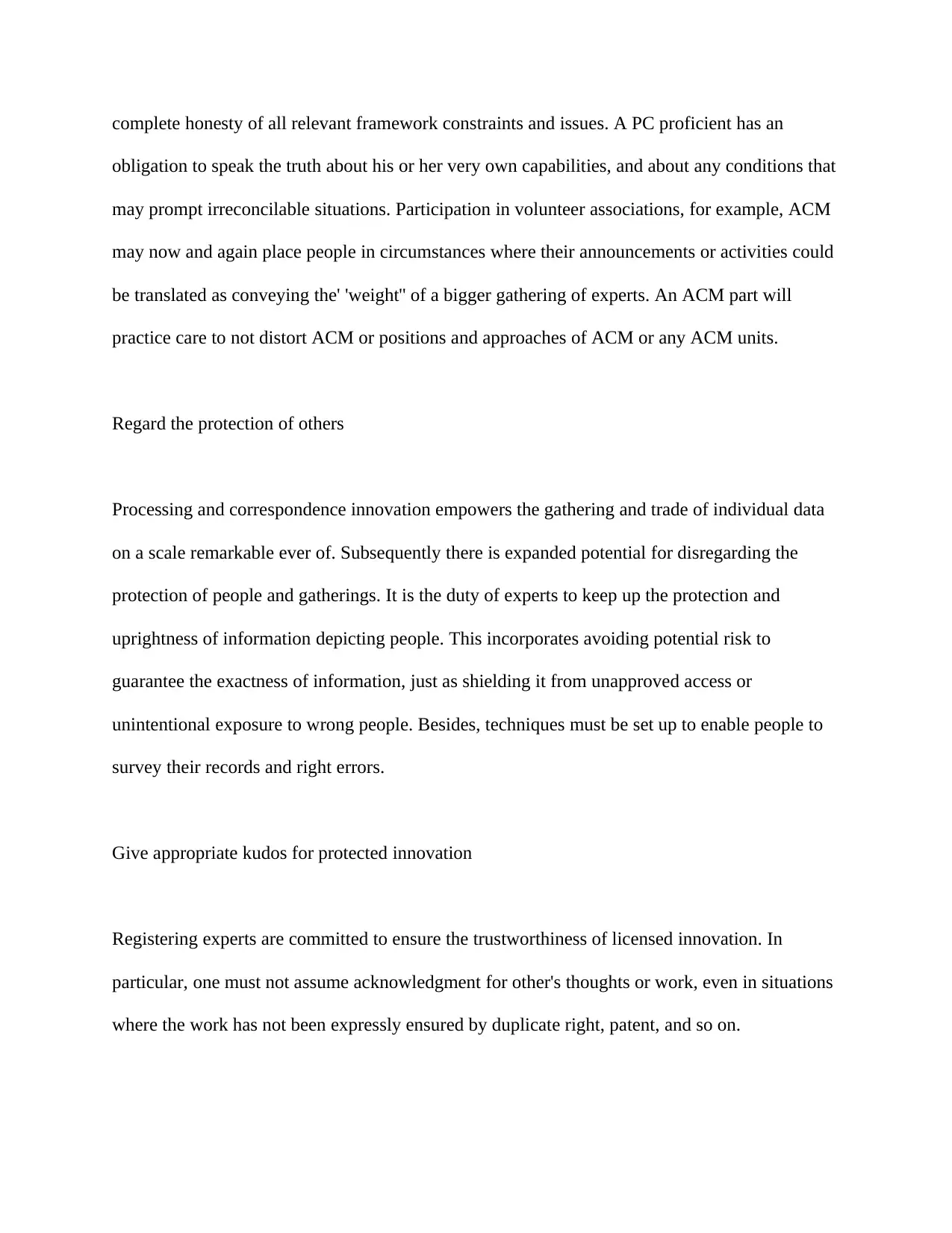
complete honesty of all relevant framework constraints and issues. A PC proficient has an
obligation to speak the truth about his or her very own capabilities, and about any conditions that
may prompt irreconcilable situations. Participation in volunteer associations, for example, ACM
may now and again place people in circumstances where their announcements or activities could
be translated as conveying the' 'weight'' of a bigger gathering of experts. An ACM part will
practice care to not distort ACM or positions and approaches of ACM or any ACM units.
Regard the protection of others
Processing and correspondence innovation empowers the gathering and trade of individual data
on a scale remarkable ever of. Subsequently there is expanded potential for disregarding the
protection of people and gatherings. It is the duty of experts to keep up the protection and
uprightness of information depicting people. This incorporates avoiding potential risk to
guarantee the exactness of information, just as shielding it from unapproved access or
unintentional exposure to wrong people. Besides, techniques must be set up to enable people to
survey their records and right errors.
Give appropriate kudos for protected innovation
Registering experts are committed to ensure the trustworthiness of licensed innovation. In
particular, one must not assume acknowledgment for other's thoughts or work, even in situations
where the work has not been expressly ensured by duplicate right, patent, and so on.
obligation to speak the truth about his or her very own capabilities, and about any conditions that
may prompt irreconcilable situations. Participation in volunteer associations, for example, ACM
may now and again place people in circumstances where their announcements or activities could
be translated as conveying the' 'weight'' of a bigger gathering of experts. An ACM part will
practice care to not distort ACM or positions and approaches of ACM or any ACM units.
Regard the protection of others
Processing and correspondence innovation empowers the gathering and trade of individual data
on a scale remarkable ever of. Subsequently there is expanded potential for disregarding the
protection of people and gatherings. It is the duty of experts to keep up the protection and
uprightness of information depicting people. This incorporates avoiding potential risk to
guarantee the exactness of information, just as shielding it from unapproved access or
unintentional exposure to wrong people. Besides, techniques must be set up to enable people to
survey their records and right errors.
Give appropriate kudos for protected innovation
Registering experts are committed to ensure the trustworthiness of licensed innovation. In
particular, one must not assume acknowledgment for other's thoughts or work, even in situations
where the work has not been expressly ensured by duplicate right, patent, and so on.
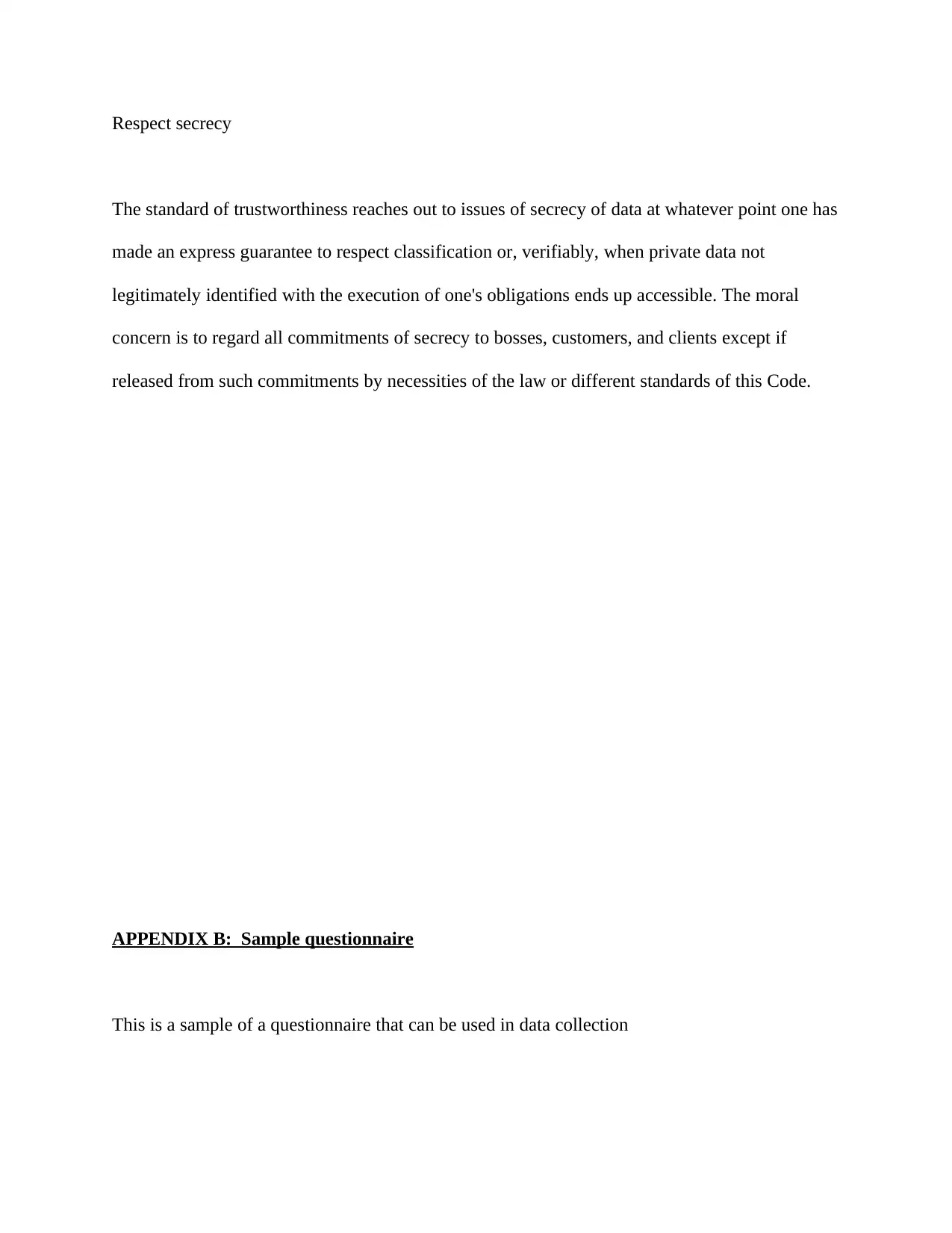
Respect secrecy
The standard of trustworthiness reaches out to issues of secrecy of data at whatever point one has
made an express guarantee to respect classification or, verifiably, when private data not
legitimately identified with the execution of one's obligations ends up accessible. The moral
concern is to regard all commitments of secrecy to bosses, customers, and clients except if
released from such commitments by necessities of the law or different standards of this Code.
APPENDIX B: Sample questionnaire
This is a sample of a questionnaire that can be used in data collection
The standard of trustworthiness reaches out to issues of secrecy of data at whatever point one has
made an express guarantee to respect classification or, verifiably, when private data not
legitimately identified with the execution of one's obligations ends up accessible. The moral
concern is to regard all commitments of secrecy to bosses, customers, and clients except if
released from such commitments by necessities of the law or different standards of this Code.
APPENDIX B: Sample questionnaire
This is a sample of a questionnaire that can be used in data collection
⊘ This is a preview!⊘
Do you want full access?
Subscribe today to unlock all pages.

Trusted by 1+ million students worldwide
1 out of 14
Related Documents
Your All-in-One AI-Powered Toolkit for Academic Success.
+13062052269
info@desklib.com
Available 24*7 on WhatsApp / Email
![[object Object]](/_next/static/media/star-bottom.7253800d.svg)
Unlock your academic potential
Copyright © 2020–2026 A2Z Services. All Rights Reserved. Developed and managed by ZUCOL.



